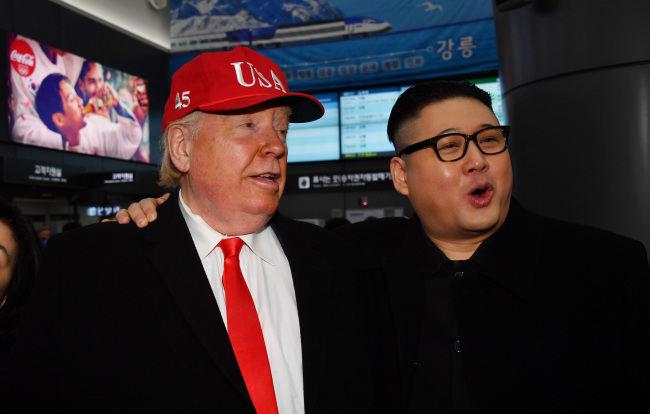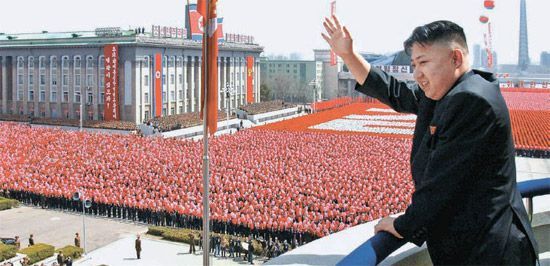‘Trump should give talk with North Korea a chance’
US experts say US-North Korea talks ‘not mutually exclusive’ from Trump’s maximum pressure strategy
By Yeo Jun-sukPublished : Feb. 13, 2018 - 16:36
With US President Donald Trump’s administration raising the prospect for direct talks with North Korea amid an inter-Korean Olympics detente, the US should pursue dialogue if Pyongyang continues to suspend nuclear and missile tests until after the Olympics, Washington-based security scholars said.
In an email interview with The Korea Herald, the analysts noted such initial talks without preconditions are necessary to determine North Korea’s nuclear capabilities and their intentions before it becomes too late to deter a nuclear-armed North Korea capable of attacking the US mainland.
The scholars, however, warned that the North’s reluctance toward denuclearization efforts would prompt the US to return to a “maximum pressure” campaign, suggesting that seeking dialogue is not a policy shift of the Trump administration, but part of its strategy of alternating pressure and engagement.
“I think the US could talk to North Korea without preconditions in order to help lower tensions and to see if any additional information can be gained about their nuclear capabilities and intentions,” said Sue Mi Terry, a senior fellow and Korea Chair at Center for Strategic and International Studies in Washington.
“However, without a fundamental shift in North Korea’s calculus about their nuclear program, the talks will probably not make much progress. This will leave the US without much choice but to pursue the same ‘maximum pressure and engagement’ strategy.”

The prospect of US-North Korea talks surfaced when US Vice President Mike Pence told the Washington Post that the US is ready to engage in dialogue about North Korea’s nuclear program even as it maintains pressure on the Kim Jong-un regime.
For such talks to happen, Terry said, North Korea must suspend its provocations during and after the allies’ joint military exercises, which they said would resume upon the conclusion of the Olympic events in March, and “clearly communicates” to the US that they have halted missile and nuclear tests.
Gary Samore, a White House coordinator for arms control and weapons of mass destruction during the Obama administration, said although it is unlikely for the US and North Korea to bridge their gap, the talks are worth pursuing to hold back the North’s relentless nuclear pursuit.
“Kim Jong-un wants to obtain sanctions relief and economic benefits ... while not making any significant concessions to limit -- much less surrender -- North Korea’s nuclear and missile (programs). In contrast, Washington is looking to trade sanctions relief for real and concrete constraints on North Korea’s programs,” said Samore.
“Because of these differences, the US-(North Korea) negotiations will be very difficult and will probably fail. Nonetheless, while the talks are underway, it will delay North Korea’s technical progress and give the US and (South Korea) more time to further strengthen their defense capabilities.”
Ken Gause, director of the International Affairs Group at the Center for Naval Analyses, said the US and North Korea should begin direct talks to figure out what can be done to prevent NK from securing a viable nuclear program with the ability to strike the US homeland.
“This can only be achieved by engagement or the military option. I prefer the former to the calamity that could come with the latter. ... I absolutely do believe the US and North Korea should talk without preconditions. Diplomacy is the art of the possible, not the art of the perfect.”

Samore said there are signs that Kim is looking to shift to a diplomatic phase. Although the North’s leader has made substantial progress toward achieving the missile capability to attack the US, he has also paid a high economic price under the international sanctions, the scholar said.
Since its last ballistic missile launch in November, North Korea has suspended missile and nuclear tests and refrained from provocative actions. Although the regime displayed intercontinental ballistic missiles during a military parade last week, the scale of the event was smaller than the previous last April.
If the North continues its moratorium on nuclear and missile tests, experts said the US could consider scaling back the scope of its annual military drill with South Korea. Last year’s Key Resolve and Foal Eagle exercises were held on the “largest-ever” scale, with US strategic bombers and aircraft carriers deployed.
“Affirming that Pyongyang would not conduct a nuclear test or launch missiles -- or at least longer-range missiles -- for a period of time would deserve to be met with some restraint,” said Patrick Cronin, senior director of the Asia Program at the Center for a New American Security.
“As a practical matter, there are a variety of adjustments that might be made to joint military exercises. For instance, strategic bombers are deemed by Kim to be provocative, and if he were willing to freeze his nuclear tests then we might look at holding back strategic bombers from exercises or shows of force.
But experts pointed out that the Trump’s administration’s increased openness to dialogue does not represent a significant political shift, warning that if North Korea appeared insincere about denuclearization, a military standoff would come back to haunt the Korean Peninsula
Cronin said the Trump administration’s policy in dealing with North Korea is consistent, employing pressure and engagement until such time North Korea shows a genuine willingness to discuss denuclearization and takes concrete steps toward it.
“The vice president simply chose an opportune time to talk about (engagement). The misreading of the Trump administration has derived mostly from the previous focus on maximum pressure and scant attention paid to diplomacy,” said Cronin.
Terry of CSIS also said the Trump administration appears to believe that engaging in direct talks with North Korea without preconditions and imposing additional sanctions are not necessarily “mutually exclusive” actions.
If North Korea responds to the joint military drill with military provocations, the US would deploy more military assets to the Peninsula or impose greater economic pressure through further secondary sanctions.
However, the punitive actions would not go as far as pursuing “bloody-nose strike,” a preventive strike scheme designed to attack North Korea nuclear and missile facilities, which some Trump’s military advisers believe can reduce the risk of escalating into an all-out war, the analysts said.
“The ‘bloody nose strike’ option is not likely to be carried out because there has been quite a bit of public opposition voiced against this potential action in the last few weeks and it is very unpopular in the US,” Terry said.
By Yeo Jun-suk (jasonyeo@heraldcorp.com)











![[Today’s K-pop] BTS pop-up event to come to Seoul](http://res.heraldm.com/phpwas/restmb_idxmake.php?idx=644&simg=/content/image/2024/04/17/20240417050734_0.jpg&u=)
![[Graphic News] More Koreans say they plan long-distance trips this year](http://res.heraldm.com/phpwas/restmb_idxmake.php?idx=644&simg=/content/image/2024/04/17/20240417050828_0.gif&u=)




![[KH Explains] Hyundai's full hybrid edge to pay off amid slow transition to pure EVs](http://res.heraldm.com/phpwas/restmb_idxmake.php?idx=652&simg=/content/image/2024/04/18/20240418050645_0.jpg&u=20240419100350)

